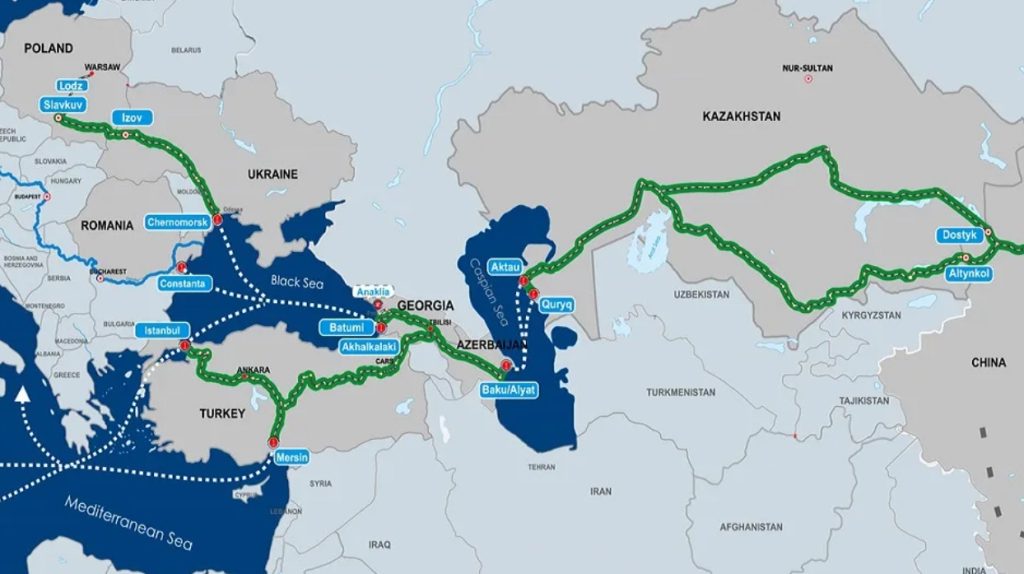The integration of the South Caucasus, Central Asian regions Alliance in the light of crisis and recession
On June 23, 2023, Kazakhstan, Azerbaijan and Georgia established a joint logistics company to improve cargo transportation between Central Asia and the South Caucasus in both directions. The decision came amid intensified dialogue between Central Asia and the Caucasus nations covering trade, economic, and energy fields in an attempt to boost interregional connectivity.
When the war in Ukraine unfolded in February 2022, many states in the East and West faced the disruption of the global food supply and energy deficit due to the depletion of Russian fossil fuels. Nevertheless, regional countries like Azerbaijan, Georgia, Türkiye, and Kazakhstan explored new ways to revitalize trade routes and boost critical infrastructure projects within the framework of the Trans-Caspian International Trade Route (TITR), known as the Middle Corridor. Moreover, considering the global economic crisis, the Caucasus and Central Asian states are keen to capitalize on that by making the Middle Corridor project attractive to Western countries.
While the new geopolitical realities make the Trans-Caspian corridor a mandatory transit point, replacing the traditional route via Russia, the number of container units passing through the corridor registered at around 19,500 cargo units in the first quarter of 2022, which accounted for a 28 per cent increase in comparison to the same period in 2021.

The set of bilateral relations between Azerbaijan-Kazakhstan and Azerbaijan-Türkiye, which have both risen to the level of strategic partnerships, add even more value to the Middle Corridor whilst increasing the chances of economic benefits for all involved parties, including the European Union and China. Indeed, the South Caucasus is the key link for Europe’s access to the Caspian basin and Central Asia, while those regions constitute the heart of Eurasia; despite that, South Caucasus and Central Asia were separate geopolitical arenas for many years.
As such, the radically shifting balance of power, such as Russia's waning influence, paved the way for regional integration and the emergence of new geopolitical alliances. As in the case of Azerbaijan, the country pushes for multivector diplomacy with all neighbours, including Central Asian nations, in order to diversify market exports and boost soft power influence. For example, Azerbaijan's trade turnover with Kazakhstan was at the level of $400-500 million in 2021. In 2022, bilateral trade volume increased by 40 per cent, reaching an all-time high of $460 million. An upward trend continued this year, with bilateral trade growing by 40 per cent, reaching $185 million.
Uzbekistan, another essential regional actor, recently opted to boost trade ties with the South Caucasus. As such, trade relations with Azerbaijan in 2022 reached $181 million, up 54 per cent year-on-year. Also, Azerbaijan and Uzbekistan launched several projects in oil and gas, petrochemistry, the textile industry, and joint investments. Considering the perspectives of trade projects, in July 2023, Uzbekistan and Azerbaijan set up an Azerbaijani-Uzbek Investment Company with an initial capital of $500 million.

Indeed, the regional states’ quest for greater manoeuvrability in the complex region has encouraged global powers to be involved in the process and assist in order to reduce Russian influence, including the US and the EU. For example, Brussels’ intentions regarding the wider Black Sea region, which includes the South Caucasus, have become more apparent since 2022. High-level visits to the region that result in actual funding for regional infrastructure improvement demonstrate the EU’s increased commitment to the South Caucasus. Another reason explaining the EU's renewed commitment regarding the region is the new gas agreement struck by the EU with Azerbaijan to quadruple Caspian Sea gas imports.
The current shift towards Central Asia also enables Türkiye to exert more influence in the energy-rich region by employing cultural and linguistic factors. Türkiye is another key partner in this project, as the country has long sought to deepen engagement with Central Asia as a way to reinvigorate its regional influence. In the past several years, Türkiye has managed to revitalize relations with all Central Asian states through the Turkic Council, now known as the Organization of Turkic States.

Recently, during his meeting with Kazakhstan President Kassym-Jomart Tokayev, Turkish President Recep Tayyip Erdoğan endorsed the cooperation on transportation and logistics, also applauding the expansion of the Baku–Tbilisi–Kars railway and critical infrastructure projects in the Caspian Sea and Kazakhstani soil. Notwithstanding the rapidly developing business ties and regional connectivity, the Western countries are still required to invest heavily and encourage the regional states to boost connectivity, thus circumventing Russian territories for trade purposes and contributing to both regions' integration.








